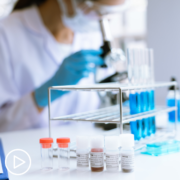Kidney Cancer Patient Expert Q&A: Dr. Moshe Ornstein from Patient Empowerment Network on Vimeo.
START HERE bridges the expert and patient voice, enabling patients facing a kidney cancer diagnosis to feel comfortable asking precise questions of their healthcare team.
In this program, Dr. Moshe Ornstein offers invaluable insights into renal cell carcinoma (RCC), equipping newly diagnosed patients with essential information on treatment priorities, as well as strategies for managing progression and recurrence.
Download Resource Guide
See More from START HERE Renal Cell Carcinoma (RCC)
Related Resources:
Transcript:
Lisa Hatfield:
Hello and welcome. My name is Lisa Hatfield, your host for this Patient Empowerment Network START HERE program, where we bridge the expert and patient voice to enable you and me to feel comfortable asking questions for our healthcare team. The world is complicated, but understanding your kidney cancer doesn’t have to be. The goal of this program is to create actionable pathways for getting the most out of treatment and survivorship.
Joining me today is Dr. Moshe Ornstein. Dr. Ornstein is a respected kidney cancer physician and researcher from Cleveland Clinic. Dr. Ornstein’s clinical practice and research are focused on cancers of the genitourinary system, specifically kidney, bladder, and prostate cancer. He has published multiple research articles and presented his research at a variety of national medical meetings. He’s actively involved in multiple clinical trials. Dr. Ornstein, it’s such a pleasure having you today, and thank you for joining us.
Dr. Moshe Ornstein:
Thanks for having me, Lisa. Pleasure to be here.
Lisa Hatfield:
So before we dive into today’s discussion, please take a moment to download the program resource guide using the QR code. This guide contains pertinent information to guide you both before and after the program. In this program, we’ll provide you with a comprehensive update on the latest kidney cancer news, and its implications for you and your family. Following that, we’ll launch into questions we have received from you.
So let’s start here. Dr. Ornstein, the treatment landscape of renal cell carcinoma, also known as kidney cancer, has evolved significantly over the past three decades, leading to improved therapeutic options and prolonged survival. That said, we also recognize that there are unmet needs to improve outcomes in kidney cancer. Today, we are privileged to have your expertise to help us decipher these developments and shed light on the advancements shaping the landscape of kidney cancer care. Dr. Ornstein, can you speak to the latest news in renal cell carcinoma?
Dr. Moshe Ornstein:
Sure, Lisa. It’s a great question. But before I start with the most recent updates and the latest news, I just want to clarify something. I think for you, Lisa, as you say the words kidney cancer and renal cell carcinoma, it’s indeed a mouthful. And for our patients, it can be very confusing as they sometimes hear kidney cancer, they sometimes hear renal cell carcinoma, they sometimes hear RCC, and it can be really hard to digest and understand what their diagnosis is, or if they see a presentation or a talk on kidney cancer, what that means.
So kidney cancer just means any cancer that arises in the kidney. There’s lots of different types of kidney cancer. For the purposes of today’s discussion, we’re really talking about renal cell carcinoma or RCC, which is the most common type of kidney cancer. And within RCC, the most common subtype is clear cell renal cell carcinoma.
So today, when you hear us talk about kidney cancer, RCC, renal cell carcinoma, clear cell RCC, just know that we’re referring to the most common type of kidney cancer. But it is a really important thing to talk to your doctors about, and for patients to talk, and their families to talk to physicians about to understand the subtype. We’ll use colloquially kidney cancer and RCC for today’s discussion. So just by way of a 30,000 foot view, when it comes to renal cell carcinoma, approximately two-thirds of patients are diagnosed when the cancer is in a localized stage, where the cancer is treated with curative intent, generally with surgery.
For patients who present with metastatic kidney cancer, in other words, kidney cancer that has spread beyond the kidney, or for patients who had their kidney removed and then developed a recurrence or the cancer had come back to the lungs or the bones or anywhere beyond the kidney, those patients are treated with what’s called systemic therapy. Those are medicines that really cover head to toe, not a specific area, but head to toe.
And when we think about treatment options in kidney cancer, there are two main treatment options. One is immunotherapy. Immunotherapy is generally what’s called checkpoint inhibitors. And these are therapies that “release the brakes” on the immune system, and allow the body’s immune system to be activated to target the cancer. And the other type of medicine is called targeted therapies. And these for the most part, are vascular targeted therapies, and the way I describe it is they shrink the blood supply to the tumors. So again, you have those tumors that are diagnosed at a local stage. You have those tumors that are metastatic or advanced beyond the kidney. And the main treatment paradigms have to do with immunotherapy and targeted therapy.
So we just had the ASCO GU meeting, and I just want to describe the updates and how they fit into sort of the overall treatment paradigms across the different treatment sections, in other words, localized and metastatic. So for a patient who presents and comes in with just a kidney mass, that’s a kidney cancer, generally that patient’s going to be treated with surgery.
In general, there’s no rule for therapy before surgery. For many years, for that patient who had their kidney cancer removed from the kidney, either part of the kidney or the whole kidney removed, we really didn’t know what to do with those patients, and the standard of care was just to watch those patients. And we’ll get into a discussion about what watching the patient means. But one of the updates from the recent meetings has been that for patients who have their kidney removed because of kidney cancer, there is now a rule in some patients, this has to be a discussion with the doctor, to use immunotherapy to help prevent or delay the cancer from coming back. It’s a personal discussion.
We have a lot of data to support the use of a medicine called pembrolizumab (Keytruda), which is an immunotherapy that patients would get for a year after their kidney surgery. So that’s really the big recent update in the localized kidney cancer world, where the kidney cancer has been removed by surgery, and there’s now a treatment option, a year of immunotherapy after surgery for the right patient. So now, we move to the metastatic patient.
So again, the patient who has metastatic disease, either comes in with metastatic disease upfront, meaning the kidney’s there, the tumor’s in the kidney, and there’s advanced disease. And the other type is the patient who had their kidney removed a year ago, two years ago, sometimes five years ago, and now shows up with new spots in the lungs or the bones or elsewhere in the body. And that is metastatic or advanced kidney cancer.
So by in large, the overwhelming majority, and in my clinical practice, 95 percent of these patients are going to get an immunotherapy-based regimen as the first treatment for advanced kidney cancer. And there are different types of immunotherapy-based regimens. There’s an immunotherapy in combination with immunotherapy, and that’s called ipilimumab (Yervoy) and nivolumab (Opdivo), so double immunotherapy, or an immunotherapy plus a targeted therapy.
Lisa, we spoke about the targeted therapy cutting the blood supply. So in addition to getting two immunotherapies, some patients won’t get two immunotherapies, they’ll get one immunotherapy in combination with a targeted therapy. And those combinations include axitinib (Inlyta) and pembrolizumab, lenvatinib (Lenvima) and pembrolizumab and cabozantinib (Cabometyx) and nivolumab as the primary combination treatments for the first line of therapy for metastatic kidney cancer.
And the real updates from the recent meetings in this setting is just that with additional follow-up, in other words, we’ve seen follow-up at two years after the trial started, three years, four years, now five years, we’re seeing that there’s a subset of patients that continue to benefit with this combination years down the road. So, encouraging for patients. Again, it’s not every patient, different patients need different things, but just the knowledge that we have long-term follow-up data for patients who have gotten an immunotherapy-based combination for the front-line treatment for their advanced kidney cancer.
And the last update I want to touch on is once we move beyond that first line of immunotherapy-based combinations, we really don’t know exactly what to do beyond that. Meaning, if somebody got an immunotherapy-based combination, and then the kidney cancer got worse, what do we give next? And generally, we’re giving more of these vascular inhibitors, these targeted therapies. And the latest advancement in this area, in the refractory setting, in other words post immunotherapy-based combination is the introduction of a new medicine called belzutifan (Welireg), which is not a classic vascular inhibitor, but is something called the HIF-2α inhibitor. It’s a very well-tolerated therapy in many of the patients. And it does have activity in the right patient. And it’s now FDA-approved relatively recently for patients who have already had an immunotherapy-based combination. So that’s kind of the major update.
The post-surgery treatment with immunotherapy, long-term data for immunotherapy-based combinations in the metastatic setting, and a novel therapy, a new mechanism of action with a pill with a therapy called belzutifan for patients whose kidney cancer is getting worse despite standard treatments upfront.
Lisa Hatfield:
Okay. Thank you so much for that outstanding overview. I had one follow-up question to that overview regarding clinical trials. So can you talk about any clinical trials you are excited about, both in the newly diagnosed setting or in the…I can’t remember what you called it, but the newly diagnosed setting and then the metastatic or recurring setting for kidney cancer, specific clinical trials, and then some of the medications that you had mentioned, are those FDA-approved right now or are those also in clinical…are most of those in clinical trials at the moment?
Dr. Moshe Ornstein:
A great question. I think what this goes to show is that, here I am talking to you, and sometimes some of the words are hard to understand. You can imagine a patient with a newly diagnosed kidney cancer, how confusing a lot of this can be. So I’m really happy we’re having this discussion. Everything I had mentioned up until this point is FDA-approved. And if I am to mention something that is not FDA-approved, I’ll make that caveat. And while we’re talking about non-FDA-approved therapies, let’s talk about some of those new and exciting clinical trials. The way I look at clinical trials, whether it’s in the treatment naive, so a patient who has a newly diagnosed cancer, or in a patient with refractory cancer, meaning cancer that has gotten worse despite some treatment already.
So I look at clinical trials, and I tend to divide them into two different main categories. And I think for patients, this sort of helps categorize them in a neat fashion. One, is looking at those trials that are investigating novel therapies. So we spoke about those immunotherapy checkpoint inhibitors, we spoke about those vascular endothelial growth factor inhibitors, in other words, targeted therapy. We spoke about this HIF-2α, those are all therapies that we understand the mechanism of action, we understand how they work.
So one kind of clinical trial is saying, what’s next? What’s down the road? What’s not an irregular immunotherapy? What’s not a regular targeted therapy? What’s not another HIF-2α drug? What are the novel therapies being investigated? So some of those trials that I’m interested in are trials that are looking at something called bispecifics. So these are singular drugs that sort of have two different targets. We’re looking at cellular therapies. We know these things called CAR-T cells work well in some of other cancers like lymphomas, but is there a rule for using this type of novel mechanism in kidney cancer?
Drugs looking at things called antibody drug conjugates, which again, these types of therapies are available in breast cancer, in bladder cancer, in other types of cancer, but not yet in kidney cancer. And that’s kind of the one category of novel mechanisms, novel agents. That’s one class of clinical trials. And the other class of clinical trials is really sort of optimizing the drugs we already have. So we know that as a general rule, giving immunotherapy plus targeted therapy is better than giving immunotherapy alone. But what about trials looking at giving two immunotherapies plus a targeted therapy?
We know that patients either get immunotherapy and immunotherapy, or an immunotherapy and a targeted therapy. What about if we gave two immunotherapies and a targeted therapy? Can three be better than two? So there are trials both in the front-line setting and in the refractory setting, looking at these novel therapies in the one bucket. And then there are also trials looking at these combinations and different ways of mixing and matching therapies that we already have to optimize patient outcomes?
Lisa Hatfield:
Great. Thank you for that description of clinical trials, too. That’s very helpful.
Okay. Now it’s that time where we answer questions that we’ve received from you. Please remember that this is not a substitute for your medical care. Always consult with your medical team. So, Dr. Ornstein, how do you explain a kidney cancer diagnosis to your newly diagnosed patients, and what are the priorities for those newly diagnosed patients?
Dr. Moshe Ornstein:
When I’m looking at a patient and their family with a newly diagnosed kidney cancer, I’m trying to think to myself a couple of things. Number one, how can I make it as easy to understand without withholding any information? How can I be as encouraging as possible, but at the same time without misleading the patient in terms of what’s to come? The way I break it down is into two main categories. There is the patient that presents with a localized kidney cancer.
So they came to the emergency room because they were having belly pain, and they were found to have a big mass growing in their kidney that is proven to be kidney cancer. And then there’s the patient who has advanced disease, metastatic disease that has spread beyond the kidney. Either they came in with metastatic disease, in other words, their kidneys in place, and they have cancer beyond the kidney. Or they already had a surgery a year or two ago, and now they come back, and the cancer has returned elsewhere in the body.
So for the patient that comes with a localized kidney cancer or kidney cancer limited to the kidney, I talk to them about what the diagnosis means in terms of what subtype of kidney cancer is it, meaning although most kidney cancers are clear cell renal cell carcinoma, there are other types of kidney cancer. And I want them to have a good handle in terms of what they have, both so that they know and they have all the information they need, but also because I understand that most patients, or at least many patients are going to look for more information elsewhere. And without understanding the histology, the type of kidney cancer they actually have, I worry that they’re not going to get the right information. So I try to be very clear about what stage is it based on the scans or if they’re coming to see me after their surgery, what stage is it after the surgery?
What does it mean when something is a grade 1 versus a grade 2 versus a grade 3 in terms of what the cells look like under the microscope? That’s about the cancer. And then I talk to them about what we’re going to look for in the future. So again, we’re talking now about the patient with localized kidney cancer. I try to go through with them what the risk of that localized cancer is in terms of what the odds are of it coming back. We talk about what kind of surveillance, what kind of watching or monitoring of the cancer are we going to do, how often they’re going to get CAT scans.
So really try to give them the big picture about what cancer they have, what the outlook is, and what we’re going to do to keep a close eye on them. For the patient who has an advanced cancer, in some ways it’s similar. When I say advanced, I mean a cancer that has spread beyond the kidney that’s going to require therapy, immunotherapy, targeted therapy, a clinical trial, whatever it might be.
And again, super important for them to understand, is this a clear cell kidney cancer? Which is the most common? Is it a papillary kidney cancer? Is it something else? Then we talk about what the different treatment options are. What does the short term look like in terms of side effects? What does the short term look like in terms of getting the cancer under control? What does the long-term outlook look like? What are the possible long-term side effects? And then what are we going to do to monitor? Are we doing CAT scans? Are we doing MRIs? Are we doing imaging of their brain?
So again, first and foremost, what’s the nature of the diagnosis, what the treatment options are and likely side effects, what they need to look out for, and then how we as a medical team are going to monitor this over hopefully the long run.
Lisa Hatfield:
We have a patient asking if you can speak to a typical patient history associated with kidney cancer and is there a common factor, or I think that they’re asking is there a cause that you see frequently for kidney cancer?
Dr. Moshe Ornstein:
Yeah, this is such a common question, Lisa, because patients want to know I have this cancer, what caused it? And generally, we just don’t know the answer to that. And I tell that to patients, it’s generally not something that somebody did that caused this kidney cancer. We do have known risk factors for kidney cancer, whether it’s obesity, smoking, high blood pressure, chronic kidney disease. So there are certain risk factors and associations, but it’s really difficult for a specific patient to be able to pinpoint this caused the kidney cancer. And I think it’s reassuring for patients to know that as a general rule, it’s not something that a patient did that caused the kidney cancer, and it’s not somebody’s fault that they have the kidney cancer.
Lisa Hatfield:
Okay. Thank you for that. What is hereditary renal cell carcinoma, and can you speak to the instance that you’ve seen in your practice? And third part of that question is, how can I protect my family?
Dr. Moshe Ornstein:
It’s a loaded question, Lisa. And the truth is, you know, patients come in and many patients are not concerned about their well-being, they’re more concerned about their family, and they want to know, “Is this something that’s going to impact my children? Do my children need to be screened for kidney cancer at an earlier age or screened at all?” Because generally we don’t screen people for kidney cancer. 90+, maybe even as high as 95 percent of kidney cancer is what’s called sporadic.
In other words, it just comes out of the blue. I tell patients in some ways it’s just bad luck. It’s not anything they did. It’s not something that they got a gene from their mother or father that caused it, and it’s not something that they’re going to pass down to their children. There’s a very small percentage, maybe about 5 percent or so of kidney cancer that’s hereditary, that does have, you know, a genetic association. That is something that they can potentially pass down, and they may have received that gene from a parent.
It’s exceedingly rare. We think about VHL syndrome, we think about something called hereditary papillary, tuberous sclerosis complex, Birt-Hogg-Dubé, but the overwhelming majority are sporadic, not associated with any specific gene in terms of a gene passed down from parent to child. What I would say is when I start to think about an inherited kidney cancer, I’m thinking more about a very young patient who comes in with kidney cancer, where we don’t expect young patients generally to have kidney cancer, or a patient who shows up with kidney cancer that’s in both of the kidneys. So there are certain unusual features that would lead a doctor to think about a hereditary or genetically associated kidney cancer. But overwhelmingly, it’s sporadic. Children are not necessarily at a higher risk, don’t need to be screened. But for these small features we do in clinic, keep an eye out for that.
Lisa Hatfield:
Okay. Thank you for that. So when you have a patient who comes in with those more unusual presentations, do you recommend that they get some type of genetic testing done, so they can be aware for their family members that maybe they should be screened?
Dr. Moshe Ornstein:
Yeah, absolutely. I mean, if there’s an unusual feature, either a feature associated with tuberous sclerosis complex or something called Birt-Hogg-Dubé, or a young patient with advanced kidney cancer where we don’t expect it, or a patient that shows up with cancer in both of their kidneys and nowhere else, that will trigger us to send the patient to a genetic counselor to do a more thorough family history and talk about what they might be looking for in terms of genetic testing.
Lisa Hatfield:
Okay. Thank you. All right. Another person watching is asking, are there known occupational exposure risk factors for kidney cancer?
Dr. Moshe Ornstein:
This is a great question. You know, we know that with certain cancers, there are classic occupational exposure risks. People want to know, “If I worked in a coal mine, am I more likely to get this kind of kidney cancer? What if I’m a Vietnam veteran and I was exposed to Agent Orange, is this more likely?” Really difficult to find those associations.
I would say that probably the biggest ones are going to be, again, smoking, which I don’t know is so much an occupational hazard, although secondhand smoke is a real risk factor for cancers. Asbestos. So people who worked around a lot of asbestos, that can be a risk factor even for kidney cancer. I know we usually think about it as lung cancer mesothelioma, but definitely for kidney cancer as well in some studies. And then certain forms of gasoline exposure. I will tell you that I’ve taken care of a lot of patients and a lot of people who have kidney cancer and have never been able to isolate an occupational exposure. But looking in the literature, we’re really looking more for asbestos, certain gasoline, secondhand smoke, things like that.
Lisa Hatifeld:
Okay. Thank you. Another patient is asking if there are any specific diets or diet recommendations for kidney cancer patients, especially as they relate to managing side effects of the treatment.
Dr. Moshe Ornstein:
We get asked all the time. And my general answer that I give, and again it’s sort of tongue in cheek, is I tell the patients the same diet that I should be following is the diet that I would recommend to you. I tell patients it’s a well-balanced diet, the right amount of carbs, the right amount of protein, the right amount of Snicker bars. I’m not a get rid of all your sugar or don’t drink any caffeine person. So I think in terms of sort of being data-driven, I would say a generally well-balanced diet.
However, some of these therapies, particularly the TKIs can cause diarrhea. They can cause mouth sores, they might change how you feel. So even though a well-balanced diet is great, we also encourage patients and empower them and their families to follow a diet that’s going to sit well with them given the therapy that they’re on.
So I care about diet much less in the sense of how’s the diet going to affect the cancer and the long-term outcome, and much more in eat the foods that your body will accept. If your body is tolerating more pasta now than it did before, because that helps your gut and therefore you’re able to stay on therapy, wonderful. If you’ve become more of a protein person because that doesn’t instigate the diarrhea, also great. If you need food that has more salt or less spice because of how your mouth feels because of the therapy, then that’s what you need to eat. So really to pay attention to their own bodies and know that whatever they fall on in terms of their diet, again, taking the extremes out of the equation, it’s okay.
Lisa Hatifeld:
You’ve made a lot of patients happy with that response. Thank you.
Dr. Moshe Ornstein:
I think I may have made a lot of spouses unhappy. But again, I think it’s important to work as a team with the medical team and with family.
Lisa Hatifeld:
Great. Thank you. One last question. A patient is asking, “I’m newly diagnosed and my stage of kidney cancer is unclear as I wait for further review. What questions should I be asking my team? It’s very scary to know you have cancer, but unclear of how serious.”
Dr. Moshe Ornstein:
The first thing I would tell this patient is, it’s okay to be scared. And there’s no right or wrong way to feel while you’re waiting for the uncertainty to be settled. Some people have trouble sleeping, some people cry, some people shy away from interacting with their friends and loved ones. And there’s no right and wrong way to respond.
Once you’re comfortable, once a patient is comfortable saying, however I feel emotionally is okay, now we can talk about what you should be asking and what they should be asking. I always try to frame it as what am I looking for in the short term, and what am I looking for in the long term? And I think it’s important to ask the team, ‘Is this cancer something that we’re going to treat with a goal of eliminating it, or is this cancer something that I’m more likely to be on therapy for the long term?”
Again, a short-term question and a long-term question, and the team can give a general overview. I think it’s okay for a doctor to say, I don’t know, or I don’t know yet. I think if you have a doctor that says that, you’re probably very lucky because they’re comfortable being honest and telling you what they know and what they don’t know and what they’re going to do to get the information.
So I would say the questions to ask are, “What’s the next step in the investigations, whether it’s additional scans or additional biopsies? What are the chances that this is something that’s only going to be a short-term issue, and what are the chances that this is something that I’m looking at sort of a chronic condition for the long term?”
Lisa Hatifeld:
Great. Thank you so much for that answer and showing compassion when you answered that question too. That’s a difficult diagnosis to receive. So thank you for that.
Dr. Ornstein, thank you so much for joining us today. We really appreciate your time and expertise. On behalf of all patients, including myself, a cancer patient, we’re so thankful for the opportunity to listen to your answers, for you to let us ask questions. So we appreciate your time. Thank you so much.
Dr. Moshe Ornstein:
Yep. Really my pleasure to be here and thanks so much for the opportunity.
Share Your Feedback
Create your own user feedback survey








